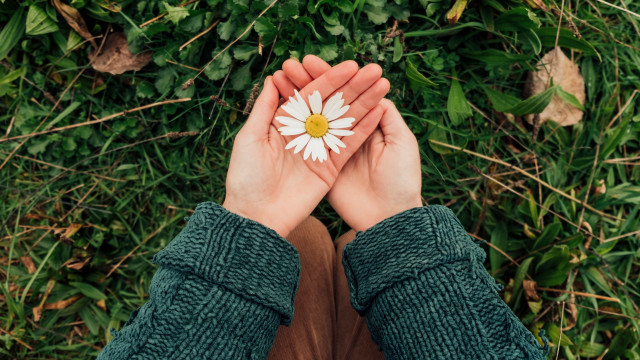Are You Lonely or Uncomfortable?

That achy, tired feeling of yearning for connection — someone to share your highs and lows with — can strike at any time; but it's most common during periods of transition or prolonged isolation.
“It’s difficult to explain loneliness in one or two words,” says Ranjith Vallathol, a Roundglass meditation teacher, but it can manifest as a result of misaligned thoughts, words, and actions, he says.
Experiencing this sense of disharmony might mean you’re not comfortable being by yourself. Because you have needs that aren’t being met, difficult emotions may arise. In the face of these scary, isolated feelings, most people try to distract themselves, says Yael Shy, a Roundglass meditation teacher who's very familiar with loneliness: “My first instinct is to reach for my phone, to scroll, to post, to Netflix, to do anything and everything possible to run away from it.”
Grasping for that quick fix will feel instinctual, but common reactions for loneliness like hiding in your devices, shopping online, or drinking alcohol aren’t sustainable ways to curb the experience. These coping patterns are known, in psychology, as defense mechanisms. “Our mind uses them for us to be comfortable when we don't get what we want,” says Vallathol. When you feel yourself leaning into a defense mechanism, remind yourself that it won't likely satisfy your emotional needs, and may make you feel even more lonely in the long run.
Rather than distracting yourself from your loneliness, consider being with it. Meditation can help you sit with your feelings and take more control when loneliness creeps up. Mindful self-examination allows you to carve out some time to listen to your longing. “Through the process of staying present, we can find our way to healing,” Shy says.
Use Meditation to Mindfully Cope With Feeling Lonely
Sitting in silence will help you notice your body’s physical sensations and the thoughts that pass through your awareness in difficult moments. Having the discipline to stay in that silence, even when distressing emotions arise, may help you become more comfortable with who you are.
If you ever feel overwhelmed by what’s happening in your body and mind while you meditate, Vanessa Dulgar, a registered psychotherapist, recommends you reconnect with the flow of your breath: “Focus on the sound that it makes; your belly expanding and contracting,” she says.
Build on this by practicing nonjudgmental awareness: Observe your inner dialogue without attaching an opinion to it. Accept that it’s part of your present experience, then release it. This is especially helpful if you feel personally responsible for being lonely or think the lack of deeper connections with the people in your life are the reason you’re experiencing a sense of isolation.
Meditation can reprogram your amygdala, which sits in the middle of your brain and mostly processes your response to threats and memories of fear. Connecting with the flow of your breath as you observe your body and mind helps retrain the amygdala to witness distressing emotions without overidentifying with them. “You become like the eye of the storm,” says Vallathol. “Always calm.”
When you can stay detached from intense feelings, you’ll have the clarity to identify your emotional needs and how to better meet them.
Flip the Script on Loneliness
Positive affirmations are another way to ease pain and sadness that can come from feeling lonely. Challenging unwelcome thoughts with statements like, “I am joy; I am love; I am part of a divine consciousness” can reprogram your mind’s tendency to turn on negative self-talk whenever you feel isolated. There’s some science behind replacing pessimistic thoughts with optimistic ones: A 2014 study found repeating happy affirmations helped to increase the number of positive beliefs participants had about themselves.
Try changing the language around how you experience loneliness. Instead of thinking, "I'm lonely," consider flipping it so it’s not wrapped up in your identity. Try something neutral like, "Loneliness is here," says Shy. This creates space for you to notice other emotions that may be present. Alongside loneliness can also be support and beauty, says Shy.
Try this class, Feeling Connected to Others, by Yael Shy, a Roundglass meditation teacher, to learn how to change your inner dialogue whenever dark thoughts begin to take over.
Let’s look at some other healthy ways to cope with feeling lonely.
Practice Self-Love to Learn Your Emotional Needs
Loving yourself means you fully accept what you’re good at in addition to the things you’re working on, are mindful of your inner dialogue, and take a kind approach to how you see and think about yourself.
Zarmina Khan, a registered psychotherapist, suggests thinking of self-love and self-compassion as the prerequisites to self-care: While self-care may look like taking a nap or a bath to de-stress, self-love and self-compassion include checking in with yourself — asking, “How can I take care of you? How are you feeling?” she says.
Emotional wounds are often stored in your body, so asking yourself questions like these may help you process and release them. "The body is this sight of wisdom and transformation,” says Shy. “It metabolizes pain and heals it.” If you feel tense, a tightening in your chest, or an ache in your heart, this is likely your body’s physical response to feeling lonely.
Whatever your experience, understand that your body is trying to protect you. Remind yourself that you are safe by focusing on how your clothes rest on your skin, or the way the ground supports your weight. Doing so might help you relax enough to tap into other emotions that you’ll need to feel to heal.
Practicing self-love can also foster a healthier, happier outlook on life — which could help you feel less alone.
The Relationship Between Self-Love and Satisfaction
It’s important to remember that how you interact with the outside world is often a reflection of what’s going on inside you. Spending time alone to check in with your body and cater to its needs means you’re less likely to be emotionally reactive or feel drained while going about your day to day.
“I would find it hard to be the best worker, daughter, friend, or partner I could be if I wasn't being the best ally to myself as well,” Khan says.
Vallathol says taking time to enjoy solitude can be recharging and refreshing. Especially in today’s digital age, where all kinds of notifications constantly compete for your attention. Spending some time alone is a great way to reset your body and mind,” Vallathol says. The more you do it, the more likely you are to experience its benefits, and this can change your perception from feeling lonely, to getting some much-needed quality "me time."
Practicing self-love can also provide stability. Turning inward for support and security is more sustainable than seeking it outside of yourself.
Self-Regulating Practices to Ease Loneliness
Knowing how to nourish your emotional needs can help you recognize that you are never alone. “Focus on what makes you feel loved and supported in this moment,” Shy says. Close your eyes and express gratitude for the oxygen that nourishes your body, or for a tree that gives you shade and know that nature cares for everyone the same way: “When we remember this,” Shy says, “loneliness can dissolve — it has nothing to hook on to.”
This is especially helpful if your close relationships are strained, or your support network lives far away. Take a deep breath in and as you exhale, give thanks to anyone that’s loved and supported you over the years, regardless of their proximity to you or the current state of your relationship.
There’s no One-Size-Fits-All Approach
A 2020 study on the relationship between loneliness and the big five personality traits found that how you experience isolation depends on your personality type and personal experiences. So, wherever you fall on the scale, remember that loneliness is part of the human condition. “Humans are relational, we need people, we need connection around us. It's how we're built to survive,” Khan says.
Pro Tip: Curious about your loneliness levels? Try this interactive quiz by University of California at Los Angeles, Alumni Daniel Russel, Ph.D.
If you’re struggling to make new friends, are going through a breakup, or just really miss your family, know that simply having casual acquaintances can help ease some of the pain. Try smiling at a person on the train or encouraging someone in your gym class. In fact, a 2013 study published in "Social Psychology and Personality Science" found that participants who smiled or made eye contact with their barista felt happier and more connected to the world around them than those who didn’t.
However loneliness shows up, use self-compassion and be patient with yourself as you learn to cater to your own needs through mindful self-examination. From this grounded state, challenge yourself to strike up a conversation with a stranger the next time you’re in a long line or are browsing at the grocery store. If that sounds scary, consider joining an online community where you can meet people casually on your own terms.
Know that it's OK to feel lonely and continue prioritize “me time” until you find those connections that truly add value to your life.
Try this course, Discover the Gifts in Loneliness, by Yael Shy, a Roundglass meditation teacher, to experience the positives of getting to spend time with yourself.
Key Takeaways
- Meditation can help in identifying loneliness.
- Changing how to talk about loneliness.
- Check in with yourself each day on what brings you joy.
- Spend time alone to nourish your mind, body and spirit.
- Learn to love all parts of yourself.









